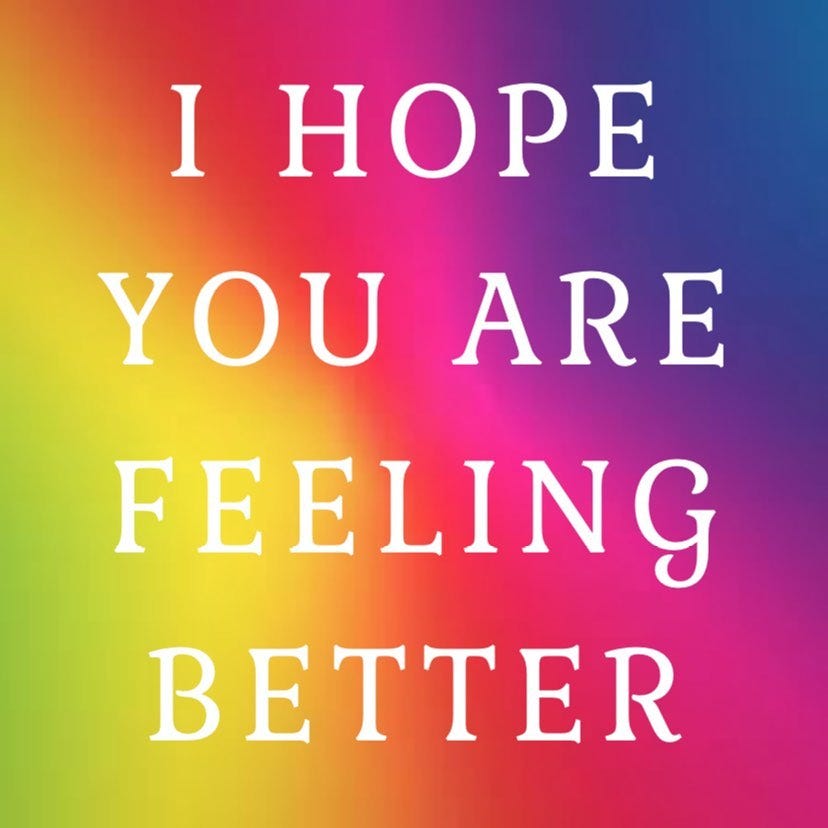“I hope you’re feeling better.” We’ve all heard it. When earlier in the day we were on the phone with insurance companies trying to get an experimental treatment covered. When we were up all night vomiting, trying to gauge whether we even had the energy to make it to the emergency room. When we are facing permanent disability and shortened life spans. When we have received a diagnosis with no cure and comprehensive treatment. When we are in the thick soup of pain that never resolves or abates.
Over the past thirteen years of illness, I have come to realize that the phrase while cloaked in compassionate concern is symptomatic of our culture’s inability to truly witness and understand suffering and illness and death. True, the phrase works if you’ve had the flu or a stomach virus. But for many people your illness doesn’t have a cure. You cannot perform the healing narrative that other people, panicked by the sense that something might not have a neat or happy ending, require from you.
When you say to someone ill, someone who has been clear they have a degenerative and incurable illness, a chronic illness, a terminal illness, a tricky prognosis, “I hope you’re feeling better”, what you are really saying is, “I want to discharge my social responsibility. And I want you, the sick person, to make ME feel better about situations that I find scary and confronting.”
What you are saying is, “Perform wellness for me. Make me feel better.”
But many of us cannot perform this. We cannot get better. We need to problematize our discomfort with people who do not follow a standard healing arc: illness, diagnosis, and recovery. What if you can’t recover? What if you can’t reenter the kingdom of the naively well? How do we stay with that complexity and witness it? When you are life-threateningly ill and someone says with a cheery smile, “Hope you’re feeling a bit better!” you are being covertly asked to perform a story of healing. And the reality of your experience is being expertly erased to appease a well person’s discomfort with disability and illness that renders you illegible, outside the normal plot line.
Your demented hope is often a way of erasing the intensity and nuance of another person’s lived experience. And this same demented hope fuels a self-congratulatory environmentalism that is looking for “good signs” instead of understanding with depth and care the cascading crises we are confronting.
Next time you feel compelled to say this to a person navigating complex and incurable conditions, take a breath. Think about what it really means. A more helpful thing to say is, “How are you today? How are you managing? What is today like for you?”
Just as we are uncomfortable with other people’s illness, other people’s dying, so are we uncomfortable with the environmental devastation and pain around us. Do not go outside and say to the clearcut forests, the poisoned East Palestine ecosystem, the microplastic-threaded oceans, “Hope you are feeling better!” If we can develop a greater capacity to witness and accompany pain and illness in each other, we will be more sober and compassionate in our assessments of our own environmental entanglements. Can we stay with the trouble?
I am not feeling better. And I may feel worse. But I am feeling with every part of me. Can you feel with me?
This has been the free version of my newsletter. If you choose to support the paid version of this newsletter, you will receive two newsletters a month featuring everything from new essays, poetry, excerpts from my upcoming books and projects, mythic research, reading lists, poetry, book reviews to ecological embodiment exercises, playlists, personal updates, and generally a whole lot of funk and texture.
I am overwhelmed with gratitude by how many of you have showed up here (and throughout the past year across platforms). As someone struggling to balance chronic illness (and just how expensive it is to be sick in America) with writing, know that you are very practically keeping me alive, keeping me afloat. Thank you deeply. I love you all so much.




as someone who is chronically ill struggling daily with debilitating symptoms while raising 3 kids mostly without support, and living with complex trauma from decades of domestic, sexual, and religious abuse when i offer up the aforementioned words, generic as they might sound they are not a mask to abate my own discomfort --they are 5 candles inside words, more akin to a spell that pleas for temporary reprieve. a miracle you might say. sometimes i don’t have the brain capacity to come up with a unique prescription that can meet the unknown in the unknowable. we never truly know what is like to live in the scare of another human’s failing body but still desire to extend the ambiguity of hope and whatever form that takes from my heart to another. just my personal perspective on overused euphemisms. i certainly understand the frustration with generics used as a defense mechanism to block attachment to human suffering, but that’s not always true. some of us truly express from deepest love-- while in the middle of personal crises.
i will sit more with this, and rethink how i extend care. always open to changing my habits.
Thank you thank you thank you for this! I wish for you in-person friends who will sit with you, support you, notice and pick up slack without having to be asked, all without making any demands of you at all. From afar as I am, I send what I think of as Quaker quiet, a silence patient enough to hold whatever needs to be held for as long as it needs to be held. ❤